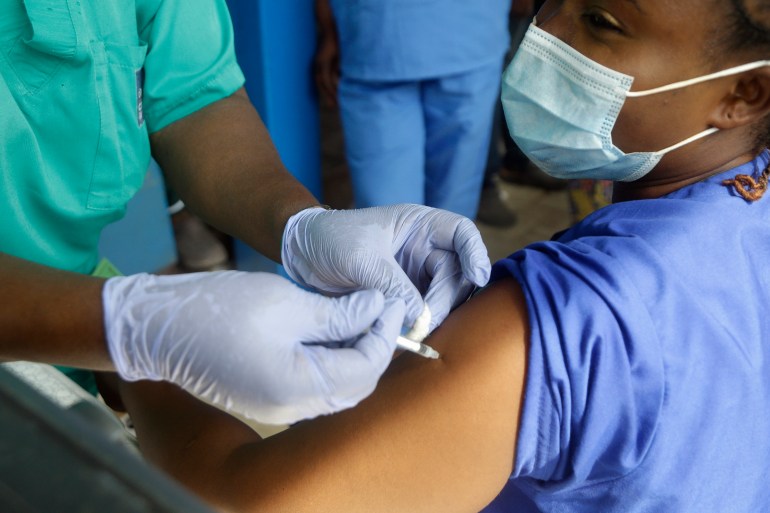The US president cast the plan as a bold move that shows the country recognises its responsibility towards the world.
United States President Joe Biden has announced a donation of 500 million doses of the Pfizer COVID-19 vaccine to the world’s poorest countries to help speed the pandemic’s end, with “no strings attached”.
Biden, keen to burnish his multilateral credentials on his first foreign trip as leader, on Thursday cast the donation as a bold move that showed the US recognised its responsibility to the world and to its own citizens.
“The United States is providing these half billion doses with no strings attached. No strings attached,” Biden said, speaking alongside Pfizer Chief Executive Albert Bourla in the English seaside resort of Carbis Bay before a G7 summit.
“Our vaccine donations don’t include pressure for favours, or potential concessions. We’re doing this to save lives, to end this pandemic, and that’s it,” he said.
 Shipment of COVID-19 vaccines provided through the COVAX global initiative arriving at the airport in Mogadishu, Somalia [File: Farah Abdi Warsameh/AP Photo]
Shipment of COVID-19 vaccines provided through the COVAX global initiative arriving at the airport in Mogadishu, Somalia [File: Farah Abdi Warsameh/AP Photo]
The US commitment is to buy and donate 500 million Pfizer doses for distribution through the global COVAX alliance to 92 lower-income countries and the African Union.
Biden had faced mounting pressure to outline his global vaccine sharing plan, especially as inequities in supply around the world have become more pronounced and the demand for shots in the US has dropped precipitously in recent weeks.
“It’s our very strong view that given the lack of coverage around the world it’s absolutely critical to make a big move like this to get more vaccines into the system as quickly as possible,” said Gayle Smith, the global COVID coordinator at the US State Department.
“These vaccines will become available as of August, even as we are pushing out the 80 million doses that have already been announced,” she said during a news conference on Thursday.
Officials said the goal is to distribute 200 million doses by the end of the year. The remaining 300 million doses would be shipped in the first half of 2022.
COVAX has thus far distributed just 81 million doses and parts of the world, particularly in Africa, have yet to receive any shipments.
 A woman receiving a vaccine dose at Yaba Mainland hospital in Lagos, Nigeria [File: Sunday Alamba/AP Photo]
A woman receiving a vaccine dose at Yaba Mainland hospital in Lagos, Nigeria [File: Sunday Alamba/AP Photo]
Several countries in Central America and in South America, where COVID-19 cases have been rising again, have also yet to make any meaningful advances in their vaccination campaigns.
Last week, Biden announced a plan to share 25 million “surplus” vaccine doses. The White House said most of the doses would be channelled to COVAX, while some six million doses would be going directly to countries.
After leading the world in new cases and deaths over much of the last year, the rapid vaccination programme in the US now positions it among the leaders of global recovery.
Nearly 64 percent of adults in the US have received at least one vaccine dose and the average numbers of new positive cases and deaths in the US are lower now than at any point since the earliest days of the pandemic.
Anti-poverty campaign group Oxfam welcomed the announcement and called for more to be done to increase the global production of vaccines.
“Surely, these 500 million vaccine doses are welcome as they will help more than 250 million people, but that’s still a drop in the bucket compared to the need across the world,” said Niko Lusiani, Oxfam America’s vaccine lead.
“We need a transformation towards more distributed vaccine manufacturing so that qualified producers worldwide can produce billions more low-cost doses on their own terms, without intellectual property constraints,” Lusiani said in a statement.
Another hurdle, especially in some poor countries, is the infrastructure for transporting the vaccines, which often have to be stored at very cold temperatures.
Source
:
Al Jazeera and news agencies
